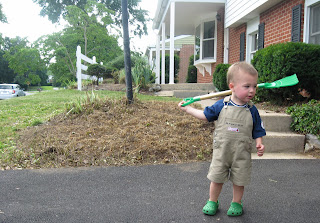- The first three years are especially important; what a child learns and decides about himself ('am I good or bad, capable or not capable?') and the world around him ('is it safe or threatening, encouraging or discouraging?') becomes part of the "wiring" of his brain.
- While the brain is amazingly flexible and is able to adapt to change or injury, there are windows early in a child's life during which important learning (like vision and language development) takes place. If those windows are missed, it may be more difficult for a child to acquire those abilities. (It makes sense why Early Intervention for kids up to age 3 is so important then.

- Some scholars belive that fast-paced modern culture (and some of our "educational" tv shows) may be adversely affecting children's ability to pay attention, to listen and to learn later in life.
- Babies and young children learn best in the context of relationships. How you and your child's caregivers relate to him - how you talk and play and nurture - is by far the most important factor in his development. Young children learn best when they are unstressed and when they live in a reasonably stimulating environment. What children really need to grow and develop is unhurried time with caring adults, people who will focus on the child and follow his cues without distraction or expectations.

- An infant's development of a sense of trust in the first year of life is directly related to a mother's sense of trust in herself.
- What you do (the behavior you model) as a parent is so much more powerful than your words in teaching a child.
- Touch helps your little one attach to you and provides both comfort and stimulation. As children grow, a pat on the shoulder or a hug may communicate more than the most eloquent speech. Speaking, too, is important. Talking and reading to infants and young children stimulate parts of a child's brain responsible for speech and language development.
- While repetition may be boring to you, it isn't to your child. Babies and toddlers learn through repetition.
- Music also appears to have a powerful influence on growing brains.

- Play is a child's work. It's how he experiences his world, learns about relationships and tries on new roles and personalities. There is no better way to understand your toddler's world than to play with him. Take time to discover what makes your little one sparkle, then create opportunities to explore. Babies also need private time to explore by themselves: "the ability to self-entertain is one of the most important skills children can develop."

- Harsh criticism, punishment or shaming may damage a child's brain.
- Remember, what children (and all of us) need to know is that they belong, that they have a special place in life, and that they have value to those around them. No matter how busy your life and no matter how serious you take your responsibilities as a parent, take time to simply love and enjoy your child. The quiet moments of wonder, the laughter and giggling, the delight you take in the special qualities, first words and adorable actions of these new little people are not wasted time but precious investments into the future of your family. The housecleaning, yard work and laundry will wait; slow down occasionally and just enjoy the time you have with your child. It speeds by all too quickly.
- Raising a young child is indeed a serious responsibility. In many ways, a child's first three years last for the rest of his life.

God blessed us with three beautiful boys. Joshua Douglas was born on 9/18/06, 15.75" long weighing 3 lbs 4 oz. He stayed in the N.I.C.U. four weeks before coming home & then had the lower section of his left lung removed. He's been doing well ever since! Caleb Luke was born on 7/8/08, 20.5" long weighing 7 lbs 12 oz. Ryan Josiah was born on 6/7/11, 20.25" long weighing 7 lbs 14 oz. Praise God for our miracle babies!
Tuesday, June 24, 2008
Positive Discipline Tidbits: Chapter 4
I haven't posted from the book I'm reading for awhile. Chapter 4 is about the 'Miraculous Brain: Helping Your Child Learn.' I found the following parts interesting from this chapter:
Subscribe to:
Post Comments (Atom)
No comments:
Post a Comment